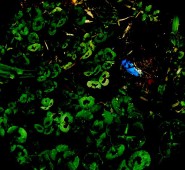I was told by the police that Mr. Purvis had put arsenic into the cookies that he had baked. They found the container in the kitchen, clearly labeled and with his finger prints upon it. Impossibilia, Henrietta, and Mrs. Duvenmeyer had all seen him that day, assembling the ingredients, an apron tied nearly about his waist and neck. None of the other residents of the house had particularly liked the man, but neither had any of us the motivation to take his life. His death was ruled an unfortunate accident.
The container of arsenic trioxide, it turns out, had belonged to Mrs. Duvenmeyer. She expressed, mostly through gestures and half uttered words, that she was a bit of an amateur chemist in her spare time. How it had ended up in the kitchen, no one could rightly say.
Mr. Purvis’s death, as far as the police were able to assess, had been the result of a series of minor events – coincidences layered upon one another building unexpectedly toward his unfortunate end.
I did not know that he had a daughter until she arrived quite unexpectedly on the front porch of the old house a few hours ago, her face smudged and teary. She told me that when she was younger he had been a painter and a roofer. She remembered with what she described as vivid clarity an event from her childhood where he had fallen from his ladder and landed on the ground two stories below: Not a bone broken; not a joint out of place. And yet that same man is dead now, killed by a fine white powder.
It is amazing that human beings can be so resilient, and at the same time, so fragile.
